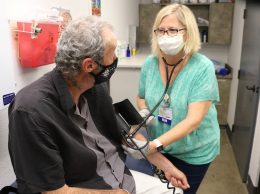Guest op/ed: Cuts to reimbursement will be devastating to state’s health care
By Tim Allison on October 7, 2011
The state of California is right to try and tackle its budget problem, but it does not make sense to do it in a way that will cost Californians more and hinder important health care access.
Yet, that’s exactly what the state is trying to do with its request for a waiver from the federal government to cut health care reimbursement rates in the Medi-Cal program. To be clear, these cuts will not solve California’s budget problem, but they will have a devastating impact on health care in California.
Last March, California lawmakers mandated a 10 percent across-the-board cut for all Medi-Cal providers, including pharmacists, doctors, optometrists and nurses. What the lawmakers didn’t realize is that money allocated for health care is not an expense, it’s an investment. This money keeps the most vulnerable — the poor, the young, the elderly and the disabled — from ending up in public hospitals and emergency rooms, which is the most expensive option for taxpayers.
That’s why the Centers for Medicare and Medicaid Services should not grant California’s request for this waiver. It’s bad medicine, bad policy and bad economics. What’s worse, the 10 percent cut is only part of California’s bad prescription for health care. The state is also seeking a revision of guidelines for reimbursements to pharmacies that serve low-income residents. These two combined changes could potentially make reimbursement rates lower than the cost of providing the service.
In other words, the state is asking doctors and pharmacists to lose money each time they treat a patient. That’s a guaranteed way to reduce the number of doctors and pharmacists who will treat the most vulnerable, and a guaranteed way to force many doctors and pharmacists to go out of business altogether.
Not surprisingly, the people of California have not reacted positively to these proposed changes. A recent survey asked likely voters what they thought of these proposed cuts. The survey found that 58.8 percent of respondents opposed the plan to cut health care provider reimbursements by 10 percent. Even more revealing was voter intensity.
Of those who oppose the plan, 75.7 percent definitely oppose it. More specifically, women expressed strong opposition with nearly 63 percent opposing it. Ideologically, the survey found bipartisan opposition to the cuts. Some 68.1 percent of Democratic voters aged 18 to 54 expressed opposition, as did 67.3 percent of voters who declined to state their affiliation. Some 60.4 percent of Republican women expressed opposition and 52.5 percent of all Republicans aged 55 and over oppose the cuts.
Perhaps most revealingly, the survey found that this bipartisan opposition wasn’t just theoretical. When specifically asked what the Centers for Medicare and Medicaid Services should do with the California waiver request, 51.1 percent said they should deny the proposal to cut the Medi-Cal program significantly higher than the number of those who supported it. Out of this number, voter intensity was high with 68.7 percent saying the centers should definitely deny the cuts.
This is a crucial time for the future of California. We need to make sure that short-term budget decisions do not negatively impact the state’s future.
The action of the California Legislature would put the Medicare and MediCal programs on life support. The good news is that the Centers for Medicare and Medicaid Services has the chance to do the right thing: stand with the people of California and turn down the California waiver request.
• Tim Allison is a former Democratic Congressional candidate in the 24th District.












